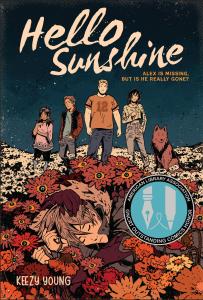Dear Reader, Love Author: Keezy Young
Dear Reader,
Hello Sunshine is a graphic novel about a boy named Alex who goes missing after a traumatic mental breakdown that involved confrontation with police. His friends and family face uncertainty, grief, and swirling nasty rumors about him. It is a story about psychosis, and stigma, and loss, and love, and hope. And while it isn’t strictly about things that have happened to me, it is also a story about me.
I have bipolar 1 with psychotic features. I developed my condition as a teenager. I experienced small town stigma, rumor-mongering, and ignorance. It runs in my family, back generations, and there have been rifts because of it–painful separations and estrangements. I have never faced police violence myself (although I will always be at increased risk) but I have lost friends to it.
I also love horror. I always have. Since the early days of Goosebumps and Scary Stories to Tell in the Dark, it has always been where I felt most electrified.
Hello Sunshine is a love letter to the genre. It is also a confrontation of the ways in which it has harmed people like me. The story came from a lot of other places, too; my adoration for 60s music; my wish that young people with psychosis would find love and compassion instead of fear and hatred and ridicule; my drive to prove to myself that I could make a book I was proud of without being fueled by manic creativity and productivity; my hope that art and stories can change the world, even just a little part of it, even in just a small way. My need to truly face my own illness, my past, the grief of my nana (whom I was very close to, and who I inherited my illness from) being diagnosed with terminal cancer, and the grief of my family’s estrangement from her dying mother, who she inherited her illness from, a woman whom I never met even though she lived 4 hours away from me. And it came from my need to face the memories of my friends who have been lost to police violence and homelessness.
But horror was an important aspect of all those hopes and dreams. Because I needed to explore why I adored something that was so often so painful and hateful towards people like me. I needed to prove that it doesn’t have to be that way, so that I could reconcile all these disparate parts of myself–my grief, my illness, my love, my joy, my shame–and become whole for the first time since I was a little kid.
And most of all, because I wanted to prove that a horror story about psychosis could be filled with hope. That it could be fun. Because part of the stigma is that once you get sick, there is nothing else in life but that. And it’s not true. There can be humor, and friendship, and romance. There can still be life there. I needed to prove that I could write a story about severe mental illness that didn’t skate over the horror and grief of it, but also didn’t forget: there is also healing.
With all the love in the world,
Keezy
A GNCRT Outstanding Comics Award Honor Book
“Beautiful, spooky, and emotional.” —Kirkus
“Excruciatingly heart-wrenching and deeply affecting, drawn with nostalgia and care.” —Booklist, starred review
“Supernatural suspense keeps readers on their toes while complex characterizations create fodder for nuanced and empathetic discussion surrounding mental health stigma and bullying.” — Publishers Weekly
“A bold accomplishment that provides an unflinching yet compassionate look at schizoaffective disorder, and how love can help those living with it.” – School Library Journal
In this lush and romantic queer horror graphic novel, a troubled teen disappears from his small town—sending his loved ones on a paranormal journey to bring him home.Noah is heartbroken. He returns from Bible camp to find that Alex, his secret boyfriend, has had a breakdown and disappeared. He wishes more than anything that he hadn’t left that day.
Sky is determined. She’ll stop at nothing to find her childhood friend, even if it means alienating the people she loves.
Izzy is ashamed. She knew something weird was going on with Alex, and she didn’t say anything to her boyfriend, Jamie—Alex’s twin brother. If she had, would Alex still be here?
Jamie is angry. Angry at Alex for being gone, angry at himself for not noticing something was wrong, and angry at his long-dead mother, Desdemona, who had problems of her own.
But what if there was something more to Desdemona’s demons? Why is Jamie seeing her ghost? And can he get past his hatred of her if it means finding out what happened to his brother?






